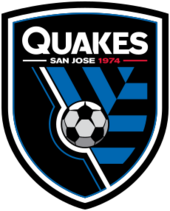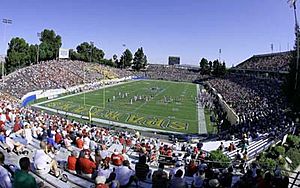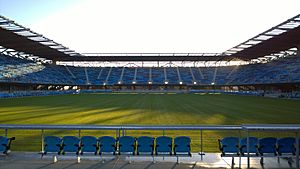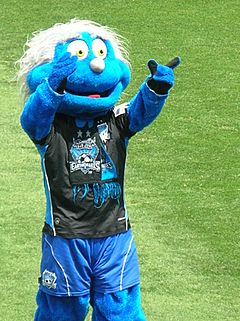San Jose Earthquakes facts for kids
 |
||||
| Nickname(s) | The Quakes The Goonies |
|||
|---|---|---|---|---|
| Founded | June 15, 1994 | |||
| Stadium | PayPal Park San Jose, California |
|||
| Stadium capacity |
18,000 | |||
| Majority owner | John Fisher | |||
| President | Jared Shawlee | |||
| Head coach | Bruce Arena | |||
| League | Major League Soccer | |||
| 2024 | Western Conference: 14th Overall: 29th Playoffs: Did not qualify |
|||
|
||||
The San Jose Earthquakes are a professional soccer team from San Jose, California. They play in Major League Soccer (MLS), which is the top soccer league in the United States and Canada. The team is part of the Western Conference.
The Earthquakes started playing in 1996 as one of the first teams in the MLS. Back then, they were called the San Jose Clash. They even played in the very first MLS game, winning 1–0 against D.C. United.
Over the years, the Earthquakes have won two MLS Cup titles (in 2001 and 2003). They also won the MLS Supporters' Shield twice (in 2005 and 2012). In 2002, they played in the CONCACAF Champions Cup, reaching the quarterfinals. The team has a big rivalry with the LA Galaxy, which is called the California Clásico.
In 2005, the team's owner decided to move the Earthquakes to Houston. This was because they could not find a place to build a special soccer stadium in San Jose. The team that moved became the Houston Dynamo. The Earthquakes then took a break for two years. They returned to play in 2008. Since 2015, the Earthquakes have played their home games at PayPal Park. Before that, they played at Buck Shaw Stadium from 2008 to 2014.
Contents
Team History
Early Days of Soccer in San Jose (1974)
The San Jose Earthquakes first started as a team in 1974. They were part of the North American Soccer League (NASL). Famous players like George Best played for them. Even legendary Brazilian player Pelé visited to play against them.
How the Team Started (1994–1999)
In 1994, a group from San Jose helped create one of the first MLS teams. This team took over player contracts and the stadium rights from an older team, the San Jose Hawks. The new team was first called the Clash. This name was suggested by Nike, a big investor in MLS.
The Clash played their first MLS game on April 6, 1996, at Spartan Stadium. Over 31,000 fans watched San Jose win 1–0. Eric Wynalda scored the very first goal in MLS history. A month later, another game against the Los Angeles Galaxy set a new attendance record for a sporting event in San Jose.
The team had some tough times in these early years. There were disagreements between players and coaches. Even with these challenges, the Clash made it to the playoffs in their first season, 1996.
The Earthquakes Return (1999–2005)
On October 27, 1999, the team changed its name from the Clash to the Earthquakes. This was because the old name was more popular with fans. In 2001, a new coach, Frank Yallop, joined the team. He made some big changes. With the help of star player Landon Donovan, the Earthquakes quickly became much better.
They won the MLS Cup 2001 by beating their rivals, the Los Angeles Galaxy, 2–1 in overtime. This was a huge comeback for the team. They continued to play well, winning another MLS Cup in 2003 against the Chicago Fire. Before that final, they had an amazing playoff game against the Galaxy. They came back from being four goals behind to win 5–4 overall. Many people called it the greatest playoff series in MLS history.
After winning two championships, the team faced some changes. In 2004, there was a plan to change the team's name to "San Jose America." Fans were very upset about this idea. The team's star player, Landon Donovan, also left to play in Germany. When he returned, his rights were traded to the Galaxy.
Even with these changes, the Earthquakes won the MLS Supporters' Shield in 2005. This award goes to the team with the best record in the regular season.
A Break and a Comeback (2006–2008)
After the 2005 season, the Earthquakes' owner decided to move the team to Houston. This happened because they couldn't get a new stadium built in San Jose. The team moved to Houston and became the Houston Dynamo. The MLS decided that the Earthquakes' name, colors, and history would stay in San Jose for a future team.
On May 24, 2006, a new group of owners, Lewis Wolff and John Fisher, made a deal with MLS. They planned to build a soccer stadium and bring a new team to the Bay Area. On July 18, 2007, an expansion team was officially given to them, and it was named the San Jose Earthquakes. This new team kept all the records and history of the original team.
In October 2007, the Earthquakes announced they would move their offices closer to their temporary home, Buck Shaw Stadium. On November 6, 2007, Frank Yallop returned as the head coach.
Back in MLS (2008–2011)
In 2008, the Earthquakes had new players like Darren Huckerby and Ronnie O'Brien. They helped the team go on a nine-game unbeaten streak. This pushed them closer to the playoffs. In October, the team also started a partnership with the English club Tottenham Hotspur.
In 2009, Amway Global became the team's jersey sponsor. The team also made an important trade, getting Chris Wondolowski from Houston. The Earthquakes missed the playoffs in 2009.
In 2010, the San Jose Earthquakes made it to the playoffs. They upset the New York Red Bulls in the first round. However, they lost to the Colorado Rapids in the next game. In 2011, the team did not make the playoffs.
The "Goonies" Era (2012–2014)
The 2012 season was one of the best in Earthquakes history. The team became known for scoring late goals to win or tie games. After one amazing comeback win against the L.A. Galaxy, player Steven Lenhart famously said, "Goonies never say die!" This phrase, from the movie The Goonies, became the team's rallying cry.
The Quakes finished the 2012 season with team records for points and goals. They won the MLS Supporters' Shield, their first major trophy since returning to San Jose. They also qualified for the CONCACAF Champions League. They made the playoffs but were knocked out by the L.A. Galaxy.
In 2013, the team struggled early on. Coach Frank Yallop left, and Mark Watson took over. On June 29, 2013, the Quakes had another incredible comeback against the L.A. Galaxy. They were down 2–0 and had a player sent off, but they scored twice in stoppage time to win 3–2. This was the first time an MLS team had done that.
The Earthquakes played in the 2013–14 CONCACAF Champions League for the first time since their return. They won their group and moved to the knockout stage. Even though they played much better in the second half of the season, they just missed the playoffs. The final home game of 2013 was special for Ramiro Corrales, who retired. He was the last active player from the very first MLS season.
In 2014, the Quakes continued in the CONCACAF Champions League. They lost in a penalty shootout to Toluca from Mexico. The 2014 MLS season was tough, with the team winning only 6 matches.
New Coaches and Stadium (2015–2021)
In 2015, Dominic Kinnear returned as coach. The team's new stadium, Avaya Stadium (now PayPal Park), opened on March 22, 2015. It was the first soccer-specific stadium in the Bay Area. The team improved in 2015 but still missed the playoffs. Chris Wondolowski scored his 100th MLS goal that year.
In 2017, Jesse Fioranelli became the new general manager. He wanted to focus on younger players and a more attacking style of play. Dominic Kinnear was replaced by Chris Leitch as head coach. The team reached the U.S. Open Cup semifinals for the first time since 2004. They also made the MLS Cup Playoffs for the first time since 2012, but lost in the first round.
In November 2017, Mikael Stahre became the new head coach. The team made some roster changes, including signing Magnus Eriksson. Stahre was replaced by Matias Almeyda in October 2018. In 2019, Chris Wondolowski became the MLS all-time leading scorer. The team missed the playoffs that year.
In 2020, the season was paused due to the COVID-19 pandemic. When it restarted with the MLS is Back tournament, the Earthquakes won their group and reached the quarterfinals.
Recent Years (2021–Present)
In June 2021, Jesse Fioranelli was replaced by Chris Leitch as General Manager. In April 2022, Matias Almeyda left, and Alex Covelo became the interim coach. In August 2022, Luchi Gonzalez was announced as the new head coach.
In 2023, under Gonzalez, the Earthquakes finished 9th and made it to the Wild Card round of the playoffs. They lost on penalties to Sporting Kansas City.
The 2024 MLS season was difficult for the Earthquakes. After a series of poor results, Luchi Gonzalez was fired on June 24. Ian Russell took over as interim coach. The team finished last in MLS, setting a new record for most last-place finishes in franchise history. On November 7, 2024, the Earthquakes announced Bruce Arena as their new head coach and sporting director.
Team Colors and Jerseys
The Earthquakes have always used blue and black as their main colors, often with white.
When they were the San Jose Clash, their logo had a black and red scorpion. When they became the Earthquakes in 2000, their new badge was a triangle with a soccer ball. The three points of the triangle represented the three biggest cities in the Bay Area: San Jose, San Francisco, and Oakland.
In 2014, the team got a new logo and uniforms. The new design still used blue and black, but it also had a chevron shape that looked like a geological fault line, fitting the "Earthquakes" name. It also included the year 1974 in red, honoring the original NASL Earthquakes team.
In 2017, they released a new black home jersey with a blue design. It also had "SJ 74" and the words "UNITY," "DEVOTION," and "HERITAGE" on it. In 2018, their away jersey was called the Navy SEAL Foundation Jersey. A part of each sale went to the Navy SEAL Foundation, making them the first MLS club to do this. The 2020–2021 away jersey used the colors of the San Jose city flag.
Uniform History
- Home
|
1996
|
1997–98
|
1999
|
2000–02
|
2003–04
|
2005
|
2008
|
2009
|
2010–11
|
2012–13
|
|
2014–16
|
2017–18
|
2019–20
|
2021–22
|
2023–
|
- Away
|
2000–01
|
2002–03
|
2004
|
2005
|
2008–09
|
2010–11
|
2012–13
|
2014
|
2015
|
2016
|
|
2017
|
2018–19
|
2020–21
|
2022–
|
Home Stadiums
The San Jose Earthquakes have played in several stadiums over the years. Their current home is PayPal Park in San Jose.
- PayPal Park in San Jose, California (2015–present)
- Levi's Stadium in Santa Clara, California (used for big games, 2014–2015, 2023–2024)
- Buck Shaw Stadium in Santa Clara, California (2008–2014)
- Spartan Stadium in San Jose, California (1996–2005)
- Oakland–Alameda County Coliseum in Oakland, California (used for big games, 2008–2009)
- Stanford Stadium in Stanford, California (used for big games, 2011–present)

For a long time, the team wanted to build a new, special soccer stadium. In 2007, they looked at building one near Spartan Stadium. However, those plans did not work out.
PayPal Park: The New Home
In 2007, the city of San Jose and the Earthquakes team decided to focus on a new location near the San Jose International Airport. This land was owned by the city. On June 12, 2007, the San Jose City Council agreed to explore building a new stadium there.
The plans for the new stadium were shared in 2009. It was designed to be a three-sided stadium with 18,000 seats. The groundbreaking ceremony for the new stadium in 2010 set a Guinness World Record for the largest crowd at a groundbreaking event, with 6,256 people!
Construction finished in early 2015. The stadium's first game was a friendly match on February 28, 2015. The official opening was on March 22, 2015, when the Earthquakes played their first home game of the 2015 MLS season against Chicago Fire. Fatai Alashe scored the first official goal in the new stadium.
Team Culture
Rivalries
The Earthquakes have a strong rivalry with the LA Galaxy called the California Clásico. This rivalry started in 1996 and is one of the oldest in American soccer. It comes from the natural competition between Northern and Southern California. The rivalry became even more intense between 2001 and 2005, when both teams won MLS Cup titles.
The Earthquakes also have the Heritage Cup rivalry with Seattle Sounders FC. This started in 2009. It's for MLS teams that carry on the names of older NASL teams. San Jose won the first Heritage Cup in 2009.
Fan Support
The Earthquakes have several fan groups, including the San Jose Ultras, Club Quake, The Casbah, The Faultline, and Epicentro74.
Punk musician Lars Frederiksen is a big fan of the Earthquakes. His band, The Old Firm Casuals, even wrote a new song for the team called "Never Say Die." This song was performed at the team's rebranding ceremony in 2014. Frederiksen has said the Earthquakes are the most "punk rock" team in the MLS.
Team Mascots
The Earthquakes have had a few mascots:
- José Clash (1996–1999)
- Rikter the CyberDog (2000–2002)
- Q (2004–2005, 2008–present)
There was no mascot in 2003. Q is still the team's mascot today.
Team Business
Money and Tickets
In 2013, the Earthquakes had 5,000 season ticket holders. The team believed that once their new stadium was built, season ticket sales would double, and the team would become profitable. After Avaya Stadium (now PayPal Park) was completed in 2015, the Earthquakes reached their goal of selling 12,000 season tickets.
Sponsors
| Years | Kit Maker | Jersey Sponsor | Sleeve Sponsor |
|---|---|---|---|
| 1996–1999 | Nike | Honda | — |
| 2000–2002 | Yahoo! Sports | ||
| 2003–2004 | Yahoo! en Español | ||
| 2005 | — | ||
| 2008 | Adidas | ||
| 2009–2011 | Amway Global | ||
| 2012–2015 | — | ||
| 2016–2018 | Sutter Health | ||
| 2019 | — | ||
| 2020 | Intermedia | Clover Wells Fargo |
|
| 2021–2024 | PayPal | ||
| 2025–present | El Camino Health | Habbas Law |
How to Watch and Listen
Since 2023, all Earthquakes games can be watched on MLS Season Pass through the Apple TV app. Some national games are also shown on Fox or Fox Sports 1.
You can listen to all Earthquakes games on the radio. English broadcasts are on 810 KGO, and Spanish broadcasts are on 1370 KZSF.
Players and Staff
Current Roster
|
|
Players on Loan
|
Team Management
| Coaching Staff | |
|---|---|
| President | Jared Shawlee |
| General Manager/Head Coach | Bruce Arena |
| Assistant Coach | Dave Sarachan |
| Assistant Coach | Shalrie Joseph |
| Assistant Coach | Steve Ralston |
| Goalkeeping Coach | Adin Brown |
| Strength and Conditioning Coach | Max Lankheit |
| Head Athletic Trainer | Manny De Alba |
| Assistant Athletic Trainer | Brendon Taguinod |
| Assistant Athletic Trainer | Beatriz Olmedo |
| Equipment Manager | Andy Dunbar |
| Assistant Manager Equipment | Hector Perez |
| Team Administrator | Sean Mearns |
Team Achievements
Club Trophies
- MLS Cup
- Champions (2): 2001, 2003
- Supporters' Shield
- Champions (2): 2005, 2012
- Western Conference
- Playoffs (2): 2001, 2003
- Regular season (3): 2003, 2005, 2012
- Team Awards
- MLS Fair Play Award: 2001, 2010
Player Awards
|
|
|
|
|
|
|
|
|
Team Records
Season-by-Season Results
Here are some recent season results for the Earthquakes:
| Season | League | Position | Playoffs | USOC | Continental / Other | Average Attendance |
Top Goalscorer(s) | |||||||||||||
|---|---|---|---|---|---|---|---|---|---|---|---|---|---|---|---|---|---|---|---|---|
| Div | League | Pld | W | L | D | GF | GA | GD | Pts | PPG | Conf. | Overall | Name(s) | Goals | ||||||
| 2016 | 1 | MLS | 34 | 8 | 12 | 14 | 32 | 40 | −8 | 38 | 1.12 | 9th | 17th | Did not qualify | Round 4 | Did not qualify | 19,930 | 12 | ||
| 2017 | MLS | 34 | 13 | 14 | 7 | 39 | 60 | −21 | 46 | 1.35 | 6th | 12th | Round 1 | Semifinals | 19,875 | 15 | ||||
| 2018 | MLS | 34 | 4 | 21 | 9 | 49 | 71 | −22 | 21 | 0.62 | 12th | 23rd | Did not qualify | Round 4 | 19,032 | 12 | ||||
| 2019 | MLS | 34 | 13 | 16 | 5 | 52 | 55 | −3 | 44 | 1.29 | 8th | 15th | Round of 16 | 19,032 | 15 | |||||
| 2020 | MLS | 23 | 8 | 9 | 6 | 35 | 51 | −16 | 30 | 1.30 | 8th | 16th | Round 1 | Not Held | MLS is Back tournament | Quarterfinals | 15,112 | 9 | ||
| 2021 | MLS | 34 | 10 | 13 | 11 | 46 | 54 | −8 | 41 | 1.21 | 10th | 21st | Did not qualify | Not Held | Did not qualify | 12,101 | 12 | |||
| 2022 | MLS | 34 | 8 | 15 | 11 | 52 | 69 | −17 | 35 | 1.03 | 14th | 26th | Did not qualify | Round of 16 | Did not qualify | 12,911 | 17 | |||
| 2023 | MLS | 34 | 10 | 14 | 10 | 39 | 43 | −4 | 44 | 1.29 | 9th | 16th | Wild Card | Round 3 | 2023 Leagues Cup | Group Stage | 18,041 | 13 | ||
| 2024 | MLS | 34 | 6 | 25 | 3 | 41 | 78 | −37 | 21 | 0.62 | 14th | 29th | Did not qualify | Round of 16 | 2024 Leagues Cup | Round of 16 | 18,782 | 9 | ||
| 2025 | MLS | TBD | TBD | TBD | TBD | TBD | TBD | TBD | TBD | TBD | TBD | TBD | TBD | TBD | Did not qualify | TBD | 9 | |||
1. Avg. attendance includes statistics from league matches only.
2. Top goalscorer(s) includes all goals scored in league, MLS Cup playoffs, U.S. Open Cup, MLS is Back tournament, CONCACAF Champions League, FIFA Club World Cup, and other competitive continental matches.
International Tournaments
The Earthquakes have also played in international competitions:
- 2002 CONCACAF Champions' Cup
- They beat Club Deportivo Olimpia (Honduras) 4:1 overall.
- They lost to C.F. Pachuca (Mexico) 3:1 overall in the quarterfinals.
- 2003 La Manga Cup (a friendly tournament)
- Played against teams from Norway and Russia.
- 2003 CONCACAF Champions' Cup
- They lost to C.S.D. Municipal (Guatemala) 5:4 overall in the first round.
- 2004 La Manga Cup (a friendly tournament)
- Played against teams from Sweden, Norway, and Ukraine. They won the third-place match on penalties.
- 2004 CONCACAF Champions' Cup
- They lost to L.D. Alajuelense (Costa Rica) 3:1 overall in the quarterfinals.
- 2013–14 CONCACAF Champions League
- Played in the group stage against teams from Canada and Guatemala.
- They lost to Deportivo Toluca F.C. (Mexico) in the quarterfinals after a penalty shootout.
Player Records
All-Time Player Leaders
These are the top players in Earthquakes history based on regular season games. Bold means the player is still active with the team.
|
|
|
Single-Season Records
|
|
Team Leaders
Hall of Fame Members
|
Players |
Builders |
Staff |
Team Captains
| Name | Years |
|---|---|
| 1996–2000 | |
| 2001–2004 | |
| 2005 | |
| 2008 | |
| 2009–2013 | |
| 2014–2021 | |
| 2022–2024 |
Head Coaches
| Name | Country | Time with Team |
|---|---|---|
| Laurie Calloway | December 7, 1995 – June 25, 1997 | |
| Brian Quinn | June 25, 1997– September 16, 1999 | |
| Jorge Espinoza | September 16, 1999 – September 22, 1999 | |
| Lothar Osiander | September 22, 1999 – January 12, 2001 | |
| Frank Yallop | February 3, 2001 – December 12, 2003 | |
| Dominic Kinnear | January 6, 2004 – December 15, 2005 | |
| Frank Yallop | November 9, 2007 – June 7, 2013 | |
| Mark Watson | June 7, 2013 – October 30, 2013 (interim) October 30, 2013 – October 15, 2014 |
|
| Ian Russell | October 15, 2014 – October 26, 2014 (interim) | |
| Dominic Kinnear | October 16, 2014 – June 25, 2017 | |
| Chris Leitch | June 25, 2017 – November 24, 2017 | |
| Mikael Stahre | November 24, 2017 – September 17, 2018 | |
| Steve Ralston (interim) | September 17, 2018 – October 28, 2018 | |
| Matías Almeyda | October 29, 2018 – April 18, 2022 | |
| Alex Covelo (interim) | April 19, 2022 – January 2, 2023 | |
| Luchi Gonzalez | January 3, 2023 – June 23, 2024 | |
| Ian Russell | June 24, 2024 – November 6, 2024 (interim) | |
| Bruce Arena | November 7, 2024 – present |
General Managers
| Country | Name | Time with Team |
|---|---|---|
| Peter Bridgwater | 1995–1998 | |
| Lynne Meterparel | 1999–2000 | |
| Tom Neale | 2001 | |
| Johnny Moore | 2002–2003 | |
| Alexi Lalas | 2004–2005 | |
| Kate McAllister and Ken Freccero (interim) | 2005 | |
| John Doyle | 2008–2016 | |
| Jesse Fioranelli | 2017–2021 | |
| Chris Leitch | 2021–Present |
Team Owners
- Major League Soccer (1996–1998)
- Kraft Sports Group (1999–2000)
- Silicon Valley Sports & Entertainment (2001)
- Silicon Valley Sports & Entertainment (Operations) / Anschutz Entertainment Group (Investment) (2002)
- Anschutz Entertainment Group (2003–2005)
- Earthquakes Soccer, LLC (2007–present)
Images for kids
-
The San Jose Earthquakes on the field at the O.co Coliseum in 2008
-
San Jose forward Chris Wondolowski (front, black kit) attempts a header against Montreal in 2013
See also
 In Spanish: San Jose Earthquakes para niños
In Spanish: San Jose Earthquakes para niños
 | Bayard Rustin |
 | Jeannette Carter |
 | Jeremiah A. Brown |







